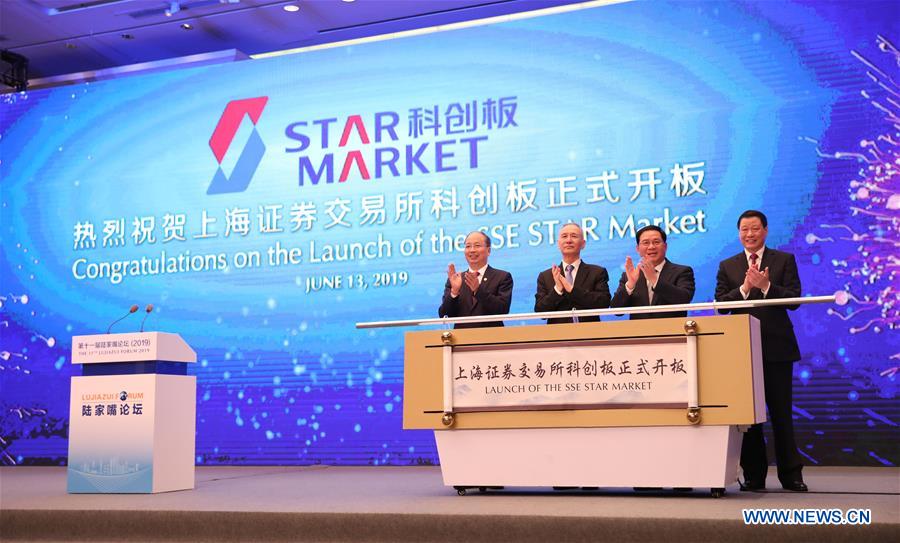
Editor's note: Matteo Giovannini is a finance professional at the Industrial and Commercial Bank of China in Beijing and a member of the China Task Force at the Italian Ministry of Economic Development. The article reflects the author's views, and not necessarily those of CGTN.
Last month, China celebrated the first anniversary of the Shanghai Stock Exchange (SSE) Science and Technology Innovation Board, most commonly known as STAR market. This a new bourse that, since its inception, has aimed to create a valid contender for America's Nasdaq and a good alternative for tech firms willing to file an IPO in a different hub other from the United States or Hong Kong exchanges.
The STAR market's astonishing performance in its first year of operations has exceeded every expectation, reaching the second spot in the global IPO ranking of this year, behind the Nasdaq and preceding Hong Kong. This has to be attributed to government reforms introduced with the goal of fast-tracking IPOs process through a market-oriented registration-based mechanism while lowering the entrance barriers, increasing the chances of financing for tech firms.
Starting from this week, Shanghai won't be alone in offering a valid platform for tech companies since it has been reported that ChiNext, the Shenzhen Stock Exchange's technology board valued at about 1.3 trillion dollars of market capitalization, is introducing similar reforms that are going to create a serious challenge to Shanghai for attracting the future listing of the most innovative domestic tech firms.
In detail, ChiNext is set to double its daily trading band, and companies will be able to rise or fall by up to 20 percent on a daily basis, compared to a limit of 10 percent before. No restrictions are going to be imposed on the trading volume in the first five days of transactions. Beijing FengShangShiJi Culture Media and Yangling Metron New Materia are part of a batch of eighteen companies that have grabbed the opportunity offered by this major reform.
The decision to introduce innovative reforms of the domestic exchanges represents a demonstration of consistency in China's plan to progress in developing its financial market. And by doubling down its effort to further expand liberalization policies to the Nasdaq-style technology board in Shenzhen, China aims at creating a healthy competition with Shanghai that is able to capture the growth of a large number of domestic start-ups and unicorns that are in growing need of funding in order to develop their businesses.

Honored guests preside over the launching ceremony of the sci-tech innovation board of the Shanghai Stock Exchange at Lujiazui Forum in Shanghai, China, June 13, 2019. /Xinhua
Honored guests preside over the launching ceremony of the sci-tech innovation board of the Shanghai Stock Exchange at Lujiazui Forum in Shanghai, China, June 13, 2019. /Xinhua
In addition, the new policies also target those Chinese companies that have a business in the Chinese mainland, but are incorporated in Hong Kong, the so-called "red chip companies." In a different period of time, these companies would have filed almost by default for an IPO in the United States. But due to the introduction of anti-China IPO rules, it now represents a golden opportunity for Shanghai and Shenzhen to attract back home domestic companies while helping to increase China's capital market size to a point that corresponds to the country's real weight on the global stage.
By empowering STAR Market and ChiNext, China guarantees a safe harbor for those Chinese tech companies that are not welcome anymore in the United States and that are searching for a place where to file for a secondary listing. It also shows that China is navigating wisely as the United States attempts to implement financial and technological decoupling.
A higher level of competition between the two major Chinese tech boards, created by similar policies aimed at leveling the playing field between STAR Market and ChiNext, is also going to support the central role of Hong Kong as a gateway to the Chinese mainland. It will leverage the city's infrastructure and rich talent pool while relying on the well-established equity and bond connect programs with the Chinese mainland's two exchanges.
Furthermore, a higher degree of domestic competition, even though it will dilute Shanghai's market share in this market segment, is going to lead to a more efficient allocation of financial resources and to a higher valuation of tech firms that are more than happy to list closer to home where the majority of their customers are located. It will also attract the attention of global institutional investors that are always in search for high returns stocks to add to their portfolios. This is going to contribute to spiral the level of pressure on the United States administration that has recently started to ask universities endowments, one of the major U.S. investment vehicles, to divest from Chinese holdings.
Increasing the volatility by loosening the equities trading barriers and introducing a market-based registration represent clear moves of Chinese policymakers in the direction of long-awaited reforms of the domestic capital market that aim at improving market efficiency while creating a healthy competition between domestic tech boards. It also demonstrates that the U.S.' increasing hostility towards Chinese firms could lead to an opportunity for China to make an important step forward in developing and increasing the appeal of its capital market.
(If you want to contribute and have specific expertise, please contact us at opinions@cgtn.com.)